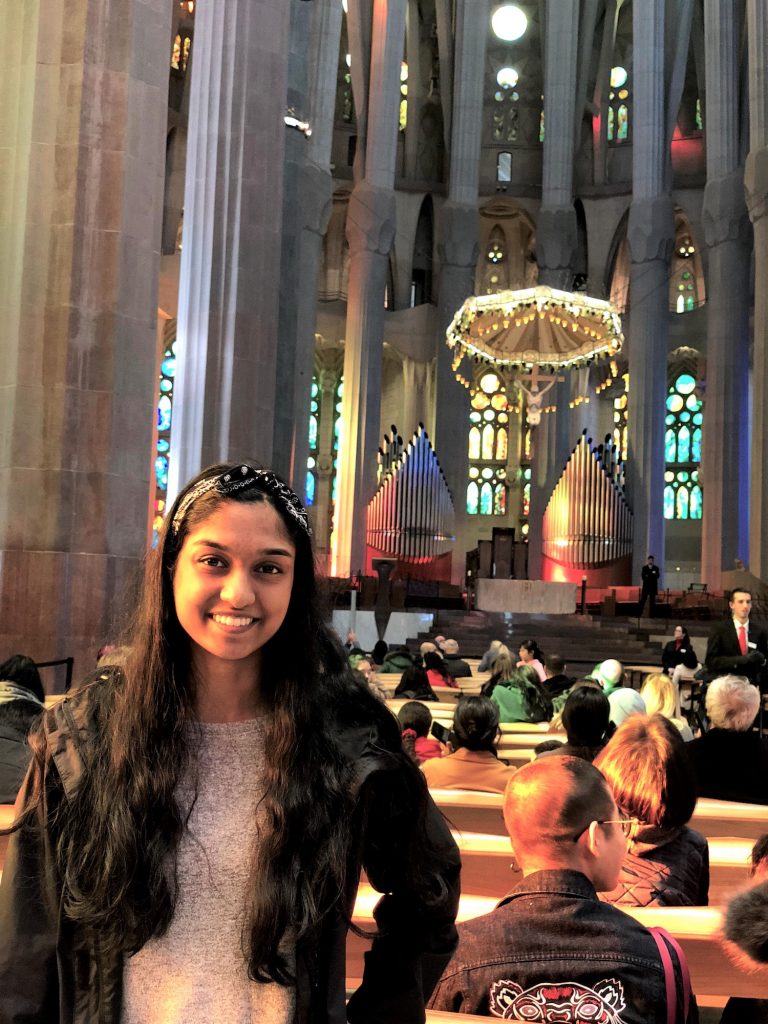
Our first undergraduate student spotlight of the new academic year features Nayha Auradkar, a junior from Sammamish, Washington who is majoring in computer science with a minor in neural computation and engineering. Auradkar currently serves as chair of the University of Washington chapter of the Association for Computing Machinery for Women (ACM-W), working to cultivate a strong, supportive community of women in the Allen School. In her leadership role, she hopes to increase programming, engagement and awareness among the organization’s members while building relationships with other minority students pursuing education in technology-related fields.
Allen School: Congratulations on becoming chair of ACM-W! What interested you in the position?
Nayha Auradkar: I believe that diversity in tech is essential for innovation and for building equitable communities. When we bring together people from various backgrounds, we gain new ideas and approaches when solving problems so that everyone, regardless of their background, benefits from technology.
I joined ACM-W my freshman year because I am passionate about diversity in tech and ensuring that women of all backgrounds are able to reach their full potential. In my sophomore year, I served as the public relations officer of ACM-W. This year, I was elected as chair. It is an honor to be leading an organization with such an important and powerful mission. I love the community of strong, supportive, and inspiring women I have met along the way.
Allen School: What are your goals for the group during your tenure as chair?
NA: As chair, my goals are to lead and strengthen the ACM-W community by creating opportunities to enable more active involvement of CSE in ACM-W. We recently created a membership system to make ACM-W more of a close-knit affinity group, and we have incorporated regular member meetings and socials into our event timeline. Additionally, we are launching committees to create more leadership opportunities within ACM-W.
Another goal I have is to recognize the intersectionality of being a woman in tech with other aspects of identity, such as a disability and race. This is important to discuss when talking about diversity, so we don’t leave behind groups that are marginalized the most. We are working on incorporating intersectionality themes into our quarterly diversity discussion events.
Allen School: How are you handling the challenges of organizing remote meetings and programs during a pandemic?
NA: Building community remotely and welcoming new students is especially challenging, which is why we are working to create more ACM-W member events and activities like member meetings, social events, and committee leadership positions.
Something I have really emphasized is making our events as accessible as possible. This is critically important, especially in a virtual world, and should be established as a norm.
Allen School: Why did you choose to study computer science?
NA: I chose to study CS because of the positive impact it can have on so many different disciplines. I am particularly interested in using CS in fields like neural engineering as well as applying CS to create technology that supports accessibility and inclusion for people with disabilities.
Allen School: What do you enjoy most about the Allen School?
NA: The people! I know I can always walk into the labs and find a friendly face. The advisers are willing to talk to and support students in anything. I feel a strong sense of community in the Allen School.
I also enjoy the rigor of the classes and the incredible research opportunities. Faculty at the Allen School are leaders in their fields, and I am grateful for the opportunity to learn from such accomplished and passionate individuals.
Allen School: Speaking of research opportunities, what kind of projects are you working on in the Make4all Lab, and why did you choose that lab in particular?
NA: As someone with a disability, I am deeply passionate about creating technologies that support accessibility and inclusion. I have had a stutter, a neurological condition, for my whole life, and my experiences as a person who stutters have shaped my interests and have allowed me to have empathy for others with similar experiences. Working in the Make4all Lab, led by Professor Jennifer Mankoff, has given me experience in Human-Computer Interaction (HCI) studies and accessible technology. I hope to carry this knowledge to wherever I end up going, so I can have a positive impact on accessibility efforts.
The project I am currently working on with my mentors Kelly Mack and Megan Hofmann is an HCI study focusing on quantitative and qualitative analysis of features of personal protective equipment designed in response to the COVID-19 pandemic.
Allen School: You also had the opportunity to intern at JP Morgan Chase over the summer. How was that experience?
NA: My intern team worked on JP Morgan’s Tech for Social Good team, and we built a web application to support a computer science education nonprofit. I loved having the opportunity to make a measurable impact on a nonprofit that supports underrepresented minorities in tech. I also worked with financial applications of technology, such as data visualization in investment banking and security in asset management. It was interesting to see so many applications of CS to areas I previously did not know much about.
The Allen School and ACM-W community is lucky to have a thoughtful, inclusive leader like you, Nayha. Thanks for all that you do!

